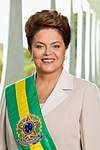Guido Mantega | |
|---|---|
 | |
| Minister of Finance | |
| In office 27 March 2006 – 1 January 2015 | |
| President | Luiz Inácio Lula da Silva Dilma Rousseff |
| Preceded by | Antonio Palocci |
| Succeeded by | Joaquim Levy |
| CEO of the Brazilian Development Bank | |
| In office 22 November 2004 – 27 March 2006 | |
| President | Luiz Inácio Lula da Silva |
| Preceded by | Carlos Lessa |
| Succeeded by | Demian Fiocca |
| Minister of Planning, Budget and Management | |
| In office 1 January 2003 – 18 November 2004 | |
| President | Luiz Inácio Lula da Silva |
| Preceded by | Guilherme Dias |
| Succeeded by | Nelson Machado |
| Personal details | |
| Born | 7 April 1949 Genoa, Liguria, Italy |
| Nationality | Italian Brazilian |
| Political party | Workers' Party |
| Alma mater | University of São Paulo |
| Profession | Economist |
Guido Mantega (Portuguese pronunciation: [ˈɡidu ˈmɐ̃teɡɐ]; born 7 April 1949) is an Italian-born Brazilian economist and politician.[1][2] Mantega served as Minister of Finance from 2006 to 2015 under the presidencies of Luiz Inácio Lula da Silva and Dilma Rousseff. His tenure as Minister of Finance, which spanned over eight years in office, was the longest in Brazilian history.[3]
YouTube Encyclopedic
-
1/1Views:35 138
-
Vale Vale3 : China, Ferro e por incrível que pareça Guido Mantega
Transcription
Early life and education
Mantega was born in Genoa, Italy. He graduated in Economics from the School of Economics, Business and Accounting of the University of São Paulo, he holds a Ph.D. in Sociology from the University of São Paulo and is a professor of economics at several universities of São Paulo.
Career
He has long been associated with the left wing Workers' Party and was a key member in the successful presidential campaign of the party's founder and leader, Luiz Inácio Lula da Silva. Upon Lula's access to power in 2003, Mantega was appointed Minister of Planning, and later chairman to BNDES (National Bank for Economical and Social Development).
On March 27, 2006 he was named Brazil's Finance Minister, replacing Antonio Palocci, who resigned in the wake of corruption charges. Mantega left office in December 2014, when he was replaced by the University of Chicago-trained economist Joaquim Levy.
In mid-2013, financial-markets commentator David Marsh wrote:
Developing-nation economic leaders such as Guido Mantega, Brazil’s outspoken finance minister — who two years ago accused the U.S. of launching “currency wars” through QE and a lower dollar, allegedly to steal a growth advantage —, have had to change their tune.
Marsh's comments came as the Federal Reserve's Ben Bernanke was beginning to explore the end of QE and one impact was a "withdrawal of liquidity" from markets such as Brazil's.[4]
Following Lula's victory in the 2022 Brazilian presidential election, Mantega was part of his transition team before choosing to leave.[5] In 2024, it was reported that Lula favors Mantega for the position of CEO of Brazilian mining company Vale S.A.[3]
Bibliography
- Guido Mantega; Paulo Vanuchi; Aloysio Biondi (1 January 1997). Custo Brasil: mitos e realidade. Editora Vozes. ISBN 978-85-326-1875-7.
- Guido Mantega; José Márcio Rego (1999). Conversas com economistas brasileiros II. Editora 34. ISBN 978-85-7326-146-2.
Notes and citations
- ^ Wheatley, Jonathan; Peter Garnham (2010-09-27). "Brazil in currency war alert". The Financial Times. Retrieved 2010-09-29.
- ^ Wolf, Martin (2010-09-29). "Currencies clash in new age of beggar-my-neighbour". The Financial Times. Retrieved 2010-09-29.
- ^ a b Durao, Mariana; Gamarski, Rachel; Carvalho, Daniel (2024-01-20). "Lula Pushes Ally for Vale CEO as Brazil's Iron Ore Miner Weighs Succession". Bloomberg. Retrieved 2024-01-22.
- ^ Marsh, David, "Main impact of QE3 withdrawal will be in Europe", MarketWatch, June 24, 2013. Retrieved 2013-06-24.
- ^ Borges, Victor (2022-11-17). "Lula's former finance minister and close aide to leave Brazil government transition". Reuters. Retrieved 2024-01-22.

